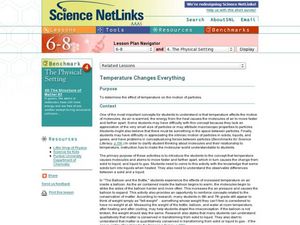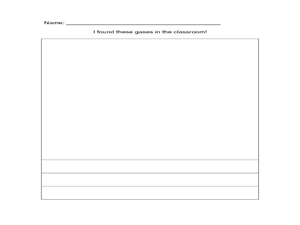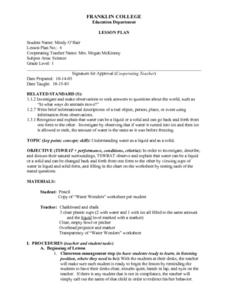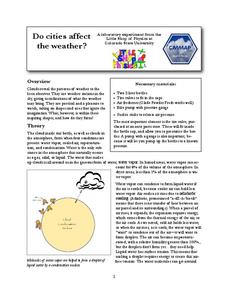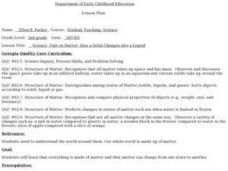Curated OER
Temperature Changes Everything
Middle school chemists visit interactive websites in order to discover what happens to molecular motion when heat is added to matter. They conduct an experiment that demonstrates the expansion of matter with the addition of heat. A lab...
Curated OER
Mixtures of Matter
Students experiment with solids and liquids. In this mixtures of matter lesson plan, students combine matter to form solutions. Students hypothesize, test, and analyze the data to draw conclusions. The lesson plan can be extended by...
Science Matters
Thermal Energy Flow in Materials
The sun sends the earth 35,000 times the amount of energy required by all of us on the entire planet, every day. The fourth lesson in the 10-part series looks at how light energy from the sun transfers into thermal energy. Scholars build...
Curated OER
Solid Water
Students turn solid water (ice) into liquid water. In this solid and liquid water lesson plan, students use water, ice, cups, and heat in order to change water from one state to another. They draw their findings as well.
Micron Technology Foundation
States of Matter
Solids, liquids, gasses oh my! Young scientists will be amazed when they try this experiment, which uses dry ice to discover the states of matter through sublimation.
Curated OER
Matter: Solids Liquids and Gases
Students participate in a science experiment to understand that matter takes up space. In this matter lesson, students experiment with solids, liquids and gases to recognize that matter is everywhere. Students make observations and...
Curated OER
Science: Solids
Second graders investigate the properties of solids and discover how to classify them. Using rulers, they measure various solids on display. In groups, they play an identification game where one students names a location, such as the...
Curated OER
Density of Liquids
Pupils apply knowledge about density of solids from previous experimentation to this activity which they investigate the density of liquids. They work in small groups to mix water and syrup, and water and oil to see what occurs. Finally,...
Curated OER
Water - Solid and Liquid
First graders conduct a science inquiry by comparing water in its liquid and solid form. The students describe the different stages of water and complete a worksheet answering questions about each form of the water. Teacher assessment...
Curated OER
Water: Liquid or Solid?
First graders investigate how water can be both a liquid and a solid. They weigh popsicles and observe them as they write in their science journals. They measure the liquid as the popsicle melts and refreeze them to change them back...
Curated OER
Liquid Level
Students observe liquids in different containers and then explore the concept that liquids have level surfaces. They identify those who are not at the center to reinforce the concept of liquid levels with a representational puzzle and...
Curated OER
Introduce Solids
Students identify and interpret a variety of solid materials - cloth, wood, metal, plastic, paper, and rubber. After a period of free exploration, they then describe the properties of the objects and develop vocabulary in order to...
Curated OER
Liquids in Bottles
Students investigate different liquids to develop their concept of a liquid. They work at a center to tip, swirl, shake, roll, and otherwise investigate seven liquids in small, clear plastic bottles: plain water, corn syrup, liquid...
Curated OER
States of Matter
Students explore the states of matter. They discuss the different phrases of matter and categorize everyday substances as solids, liquids, or gases. Students explore the relationship between the phases on an atomic level and the role of...
SFPOnline
States of Matter Worksheet
Young scientists get to the heart of the matter as they complete this learning exercise on the properties of solids, liquids, and gases.
Chymist
The Solubility of a Salt in Water at Various Temperatures
An educational lesson allows young chemists to test the solubility of different types of salt at various temperatures. Groups create a graph using data from unsaturated, saturated, and supersaturated solutions.
Virginia Department of Education
Heat Transfer and Heat Capacity
It's time to increase the heat! Young chemists demonstrate heat transfer and heat capacity in an activity-packed lab, showing the transitions between solid, liquid, and gaseous phases of materials. Individuals plot data as the changes...
Columbus City Schools
What’s Up with Matter?
Take a "conservative" approach to planning your next unit on mass and matter! What better way to answer "But where did the gas go?" than with a lab designed to promote good report writing, research skills, and detailed observation. The...
Colorado State University
Do Cities Affect the Weather? (Making a Cloud in a Bottle)
The dynamics of a city can have a drastic effect on the weather. A hands-on lesson asks learners to build a model to illustrate how city pollution provides a nucleus for condensation. The greater the pollution, the greater chance for...
It's About Time
Polymers
All plastics contain polymers, but not all polymers are plastic. Young chemists make their own polymer and compare the properties to those of other states of matter. After a reading passage, pupils answer analysis questions about natural...
Serendip
How Do We Sense the Flavors of Food?
We taste with our taste buds, so why do flavors change when we have a stuffy nose? Scholars experiment with taste testing while holding their noses and then while smelling. They record their observations in pairs and come together to...
Curated OER
Science: How Solids Become Liquids
Second graders discover how matter changes from one state to another by observing melting ice cubes. They decide on means to warm the ice and predict what will happen. Students record how long it takes for the cubes to melt.
Curated OER
Solids, Liquids, and Gases
Students explore solids, liquids, and gasses and categorize and describe the three states of matter. In this chemistry lesson, students categorize items as solid, liquid, or gas based on the definitions given by the teacher. Students...
Curated OER
How Does a Liquid Become a Solid?
Students explore the energy changes from a liquid to a solid. They model the arrangement of a solid and the change in states due to changes in energy using desks and chairs. Assessment questions are provided in lesson plan.


